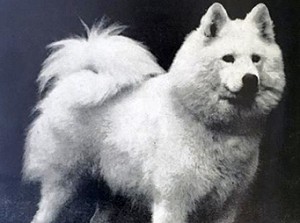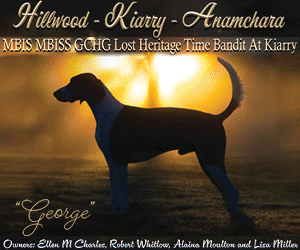The Smiling Dog – The History of the Samoyed
166 – July, 2018
BY LEE CONNOR
 In the countries of the frozen far north, where vast herds of reindeer are kept by the indigenous people, several breeds of dog have been bred to control the movements of these docile, though somewhat stubborn animals. They also provided protection from packs of marauding wolves and bears.
In the countries of the frozen far north, where vast herds of reindeer are kept by the indigenous people, several breeds of dog have been bred to control the movements of these docile, though somewhat stubborn animals. They also provided protection from packs of marauding wolves and bears.
The Samoyed takes its name from the nomadic tribe that fostered it, the Samoyed people of Northern Siberia. A great deal has been written about the precise whereabouts of this tribe and the land they roamed. If you wish to get a precise idea of its location take a map of North Russia and find land east of the Ural Mountains and west of the Yenisei River. This is the home of the Samoyed. Their land is particularly unforgiving, lying under snow for two-thirds of the year, the air humming with mosquitos for the short humid summer, but somehow, humans (and their dogs) managed to eke out a living. The Samoyed people valued their dogs, second only to their reindeer and, although Tooke (who visited the Samoyed people in 1779) mentions the tribe wearing ‘white shaggy dog skins’, their dogs were treated extremely well while they were alive. Food was often taken with the men and women sitting in a circle tearing up the reindeer meat and throwing scraps and bones to their dogs who sat in a larger circle around them. The dogs also wandered in and out of the tents at will and at night they slept as close to their masters as they could – heat from whatever source being a precious commodity in these northern latitudes. Because of this close bond and because of the many generations of Samoyeds that have shared the homes of the Samoyed people, the breed is still at its happiest when in human company.
I think the biggest misconception about the Samoyed (and one that I also held) was that it was bred to pull sledges. Although it was indeed sometimes used for this purpose by the native people (and it was certainly given this role by the nineteenth century Polar explorers, as we shall see later), its original role was very much like that of a sheep or cattle dog.
Click here to read the complete article166 – July, 2018

Short URL: http://caninechronicle.com/?p=146995
Comments are closed











